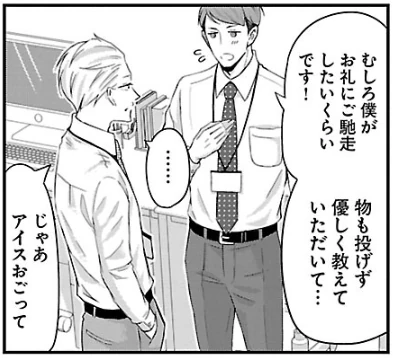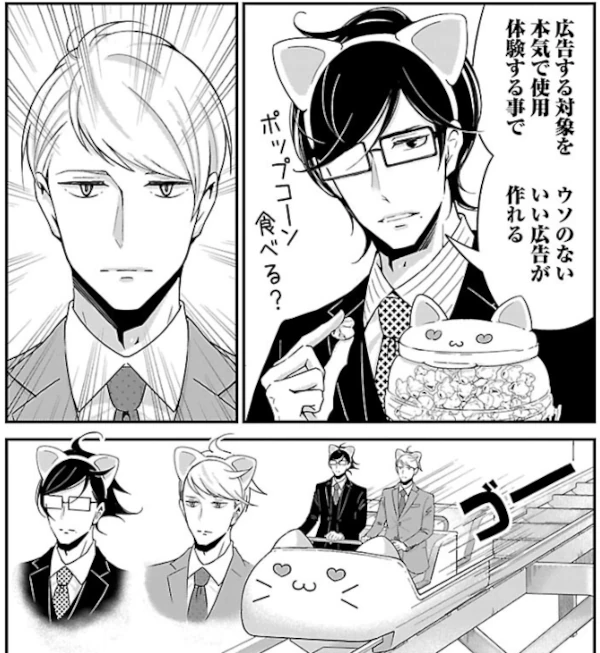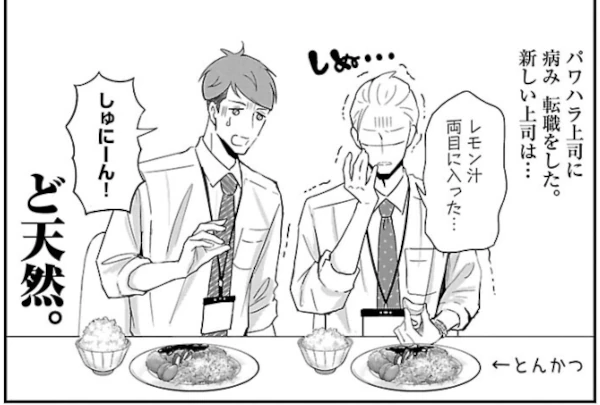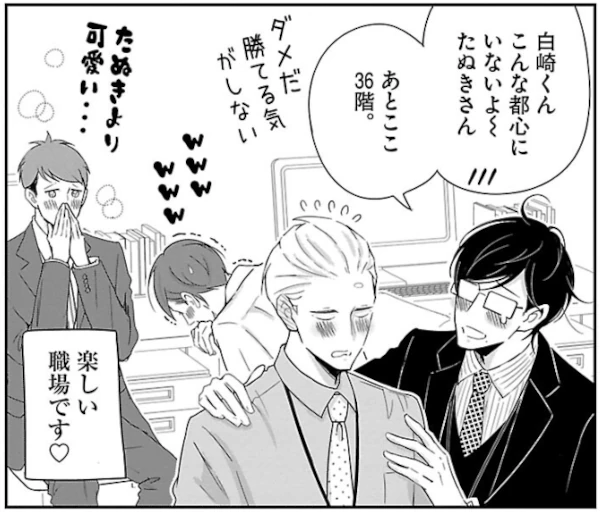This time, we’re introducing Atarashii Joushi wa Do Tennen—a manga perfect for learning real-life business Japanese in a fun and heartwarming office setting.
Work Information

Atarashii Joushi Ha Do Tennen (新しい上司はど天然)
Author: Ichikawa Dan
Publisher: Akita Publishing
Amount of text: moderate
Challenge level: ★★
Latest volume : Vol.2(May.2020 / Ongoing)
Story overview
“What if this new boss is also an abusive one…?”
After having his mental health and stomach ruined by his former boss, Momose, 26, switched jobs. Facing his new boss, Supervisor Shirasaki, his anxiety and stomach pains flare up again! However, his worries are quickly dispelled when he discovers that his new boss is, unexpectedly, a complete airhead…!
The Appeal of This Manga
This series once took first place in the “Web Manga General Election 2019,” a contest to determine the most beloved web manga of the time. Depicting a heartwarming office life with an adorably airheaded boss, the story resonates especially with modern Japanese readers—many of whom are overwhelmed by daily stress and in search of emotional healing. It’s particularly popular among female readers as a “deeply soothing” work that offers a gentle escape from everyday pressures.
While much of the manga’s charm lies in the clumsy episodes of Supervisor Shirasaki, the airheaded boss, what truly warms readers’ hearts is the quiet kindness and consideration behind his actions.
Why this manga is suitable for learning Japanese
This manga is not only entertaining but also highly recommended for Japanese learners for several reasons.
A good example of polite language used with a boss in the workplace
Momose always uses polite language when speaking to her boss, Shirasaki. While not overly formal, the expressions combine humble and respectful language, making it a great introduction to business etiquette that goes beyond basic polite speech.

It’s a light-hearted comedy
While some manga rich in examples of business etiquette can be challenging or text-heavy, this work is a light comedy, allowing readers to enjoy the story while easily learning polite language.

Phrase Spotlight
100% Natural Goofball? What ‘ど天然’ Really Meansど天然

What Does 「ど天然」 Mean? The Roots of the Word: From Fish to Personality
The word 「天然」 (tennen) originally comes from phrases like 「天然もの」, which refers to things that are “natural” rather than artificially made or raised—especially used in contrast to 「養殖もの」 (yōshoku mono), meaning “farm-raised.” For example:
・天然の魚 = wild-caught fish
・養殖の魚 = farm-raised fish
Over time, this idea of “natural” started being applied to people’s personalities, particularly those who are a little airheaded, slow to catch on, or say odd things—but in a lovable and innocent way. So if someone is called 「天然」, it means they’re not pretending to be silly—they’re genuinely, naturally that way.
Breaking Down the Phrase: 「ど天然」
Now let’s look at the structure:
・天然 (tennen) – “Natural,” used here to describe someone who is naturally airheaded or spacey
・ど (do) – An intensifier that emphasizes the degree, roughly meaning “super,” “ultra,” or “completely”
Putting it together:
「ど天然」 = “Super airhead” / “Extreme natural goofball”
This slangy prefix 「ど」 shows up in other strong expressions too, like:
・どハマりする – to be totally hooked (on something)
・どストレート – completely straightforward or blunt
In short, 「ど」 adds emphasis and exaggeration, giving the word more dramatic or playful impact.
Why It Can Be Confusing for Learners
This term may confuse learners for a few reasons:
・It doesn’t literally mean “natural” anymore. In this usage, it’s a slangy, cultural expression for someone’s personality.
・「ど」 is not a standard prefix. It’s casual, emotional, and not taught in textbooks early on.
If someone says:
あの人、ど天然だよね
It means: That person is a total space cadet! (But usually said with fondness, not cruelty.)
Cultural Note: The Birth of 「天然」 in Pop Culture
The slang use of 「天然」 is said to have originated in Japanese comedy. A famous Japanese comedian once described another performer—known for his unpredictably strange and innocent behavior—as “tennen”, meaning he wasn’t acting that way on purpose. It just came naturally.
Since then, the word spread to everyday conversation, especially in youth slang and pop culture, where it’s often used to describe cute, quirky characters in manga, anime, or real life.
English Equivalents
While there’s no perfect one-to-one translation, here are some rough equivalents:
・“Airhead (in a sweet way)”
・“Total space cadet”
・“Lovable goof”
・“Adorably clueless”
Final Thought
Understanding phrases like 「ど天然」 gives insight not just into language, but into Japanese humor and social relationships. It shows how personality traits are described in a casual, affectionate way. So next time you hear it in an anime or manga, you’ll know—it’s not an insult, it’s a compliment (most of the time)!
A Little Warning
Kinjo’s polite language is casual
Kinjo, who joined the same department after Momose, has a cheerful, modern personality, which often makes his polite language more casual. For beginners in business etiquette, it might be best not to imitate his style too closely.

A company this peaceful (probably) doesn’t exist in reality
If you’re wondering whether a peaceful and soothing company with an airheaded boss and a needy supervisor is common in Japan, the answer is definitely not. However, since nothing is impossible in this world, such a company might actually exist somewhere in Japan.

Work Information

Atarashii Joushi Ha Do Tennen (新しい上司はど天然)
Author: Ichikawa Dan
Publisher: Akita Publishing
Amount of text: moderate
Challenge level: ★★
Latest volume : Vol.2(May.2020 / Ongoing)
Here’s a safe and convenient way to purchase Japanese manga.
This Blog’s ConceptIn this blog, we are introducing manga that are not only highly captivating but also ideal for Japanese language learners. Studying Japanese through manga is both fun and effective. Manga allows you to understand the subtleties of keigo (honorifics), teineigo (polite speech), and casual conversation in Japanese. We hope you find works that match your interests and use them to enhance your Japanese learning journey.